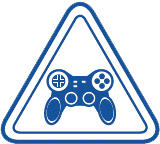"
 My organization Global Kids has been working in the field of serious games and games based learning for several years, directly with young people in New York City, and with several other institutions like the New York Public Library and the Field Museum of Chicago. We love digital games and what they can afford for young people, informally and in a structured environment.
My organization Global Kids has been working in the field of serious games and games based learning for several years, directly with young people in New York City, and with several other institutions like the New York Public Library and the Field Museum of Chicago. We love digital games and what they can afford for young people, informally and in a structured environment.
That said, I have to say I am pretty appalled by this new "Video Game Belt Loop" and "Video Game Academics Pin" being offered by the Boy Scouts of America. The messages of these gaming achievements seem aligned strongly toward consumerism, gaming as unproductive and potentially dangerous, and learning as something that happens outside of their gameplay. Frankly, this is the direct opposite of how we and a growing movement of educators around the world are orienting toward digital games and young people.
Let's look in detail at what the Boy Scouts "belt loop" and "academic pin" are oriented toward….
Here's some of the values and messages being expressed in these two Boy Scout achievements about digital gaming:
Message #1: Video Games Are Dangerous and Need Regulation
The main message of these achievements is that digital games are by their nature distractions from what you should be doing , i.e. homework, chores, etc. There is of course valid reasons for concern for kids whose gaming activities have serious repercussions on their school work, relationships and health. But for the most part this orientation is geared around fears about the worst aspects of this activity.
In fact, games have always been a part of young and adult people's lives, and will always be. We are a game-playing species. Development experts have long known that games serve important roles in mental development, preparation for adult roles, and socialization.
Substitute soccer or chess for "Need for Speed" or "Star Wars Galaxies" and most parents would not solely be oriented toward the negative aspects of these non-digital games.
So a better activity might be one around having the young person brainstorm with their peers or an adult what are the pros and cons of digital gaming. Which brings us to one of the "pros" — educational games.
Message #2: The Only Learning in Games is from "Educational / Edutainment Games"
The other misguided message is that the only learning that takes place in digital games is from explicitly education focused gaming. I.e. "Math Blaster" school-based skills-acquisition games that rely on repetition and lots of screen reading. In other words: not fun.
In fact, a lot of learning happens even in the most violent games like
"Grand Theft Auto" and "God of War." Often that learning involves
systems thinking, strategic focus, resource allocation, and other skills
beyond simply reaction time and hand-eye-coordination. Once you are
involving multiple players interacting then there are many other
learning possibilities, including team coordination, leadership, and
time management. Managing a medium-sized guild in World of Warcraft can
be as complicated as running a small business!
So the question becomes not which games teach, but what is being taught by a particular game. That would be a cool activity to have a young person engage in with an adult.
Message #3: Videos Games Are about Consumerism
The activities in the "Academic Pin" seem firmly aligned toward the act of shopping — "decide on a video game," "compare game systems," "decide which store has the best deal." This just seems like a strange focus that seems to ignore all the other ways that young people could be oriented toward digital games.
What if you had a "sports pin" that was oriented toward getting the best deal on running shoes, shopping for the cheapest tennis racket, and comparing different brands of protective gear?
Much better would be to facilitate a more comprehensive and informed understanding of digital games as a form of media and human activity. I.e.:
- Game Design: What kinds of games are there? What makes digital games unique versus non-digital ones? How are games made?
- Game Criticism: What makes a good game? What messages are being expressed by a particular game?
- Game Creation: How could I create a game? What kind of game would I make? What messages would I want my game to express or lesson I would want the player to learn?
So overall, I think that these video game pin and belt loop miss an important opportunity to engage young people in a deeper way about their gameplay activities and facilitate conversations with their peers and adults about digital culture, learning and media representations. Instead they create rewards around being a smart shopper and playing boring edutainment games. What?
Not coincidentally, Global Kids in our own work in the games space deals with these issues ( and more ) when we work with young people. And we are working on developing our own "games badge" for another youth development organization that we'll be sharing out very soon.
UPDATE 5/18/10: The School Library Journal has an article about the Boy Scout's gaming pin entitled "Cub Scouts’ Video Game Pin Sending Wrong Message?" I got a nice quote in it toward the end of the piece!
Adhering to your remarkable writings, I get hold of the idea is actually of the extraordinary theme and also successful tips.Suppose which I may undoubtedly attain exactly what specifically I learn through your views.Thanks a lot!
learn how to dance salsa
Great article post. Awesome.